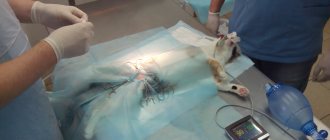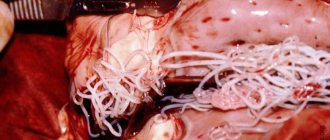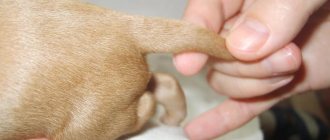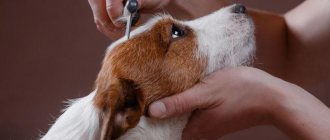Sooner or later, every owner wonders whether their dog needs to be sterilized. And if in the USA and Europe people have long been familiar with the main nuances of this operation, then in Russia there are still many prejudices.
Owners are afraid that they will deprive the male of his manhood and the female of her reproductive function, ruining the lives of their pets. The possible consequences in the form of obesity and loss of activity are no less frightening. Veterinarians advise not to trust stories, but to better understand the topic and become familiar with the benefits of the procedure.
Castration or sterilization
First, let's figure out what dog castration is and how it differs from sterilization.
Typically, people who have never had a cat or dog believe that castration is a “male” operation, and sterilization is a “female” operation. However, these procedures differ not depending on the sex of the animal, but according to the principle of implementation. Castration of dogs means:
- in males – surgical removal of the testes (testicles),
- in females – surgical removal of the ovaries, or the ovaries along with the uterus.
Sterilization of dogs involves:
- in males - ligation of the seminal ducts,
- in bitches – tubal ligation.
As a result of both castration and sterilization, the dog permanently loses the ability to reproduce. After castration, the dog completely loses interest in the opposite sex, and female dogs go into heat. And after sterilization, the animal can mate, since the genitals are preserved and continue to produce hormones.
Owner reviews
Maria U.:
“For a long time we didn’t dare to sterilize our dog. As a result, she lasted until she was 7 years old, when inflammation of the prostate began, and the operation was performed as an emergency. Next time we will try not to make such a mistake."
Gennady K.:
“I have a dog trained to hunt. My wife insisted on castration because the dog constantly leaves marks during walks. Recovery took up to 1 month, after which working abilities did not deteriorate.”
Why neuter your dog?
As we found out, castration of a dog means removal of the reproductive organs of an animal of any gender. But why is this operation necessary? And why can’t we limit ourselves to sterilization?
Veterinarians recommend castrating females and males in some cases.
- Cryptochrism is a condition where one or two testicles in a male dog are not descended into the scrotum. Due to the congenital anomaly, there is a high probability of developing an egg tumor, so it is better to take preventive measures.
- Prostatitis, cysts and other neoplasms in the gonads are direct indications for castration of male dogs.
- Complications in a bitch during pregnancy or after giving birth can threaten the life and health of the animal. If the dog has reached sexual maturity, there is a risk of uncontrolled conception, which is important to prevent with surgery.
- The development of oncology of the reproductive system and pyometra (purulent endometritis) in bitches is radically prevented.
- If the dog is used as a sled dog, guard dog, hunting dog or guide dog, castration will improve its performance. After castration, the animal will not run away in search of a partner and will be able to concentrate on the task.
- The dog's behavior may be inappropriate due to an excess of sex hormones. It is necessary to castrate male dogs with bouts of causeless aggression, spontaneous ejaculation, and frequent random erections. After the operation, the pet’s behavior changes for the better - the dogs stop marking territory, rushing at other dogs, do not try to dominate the owner, and become more manageable and balanced. Changes in character are expressed more clearly in males compared to females. Now they go outside for walks and toilets, not for adventure. However, in this situation, it is important to distinguish between hormonal imbalance and the usual bad manners of the pet. If the first is corrected by castration, then flaws in training and bad character will not go away.
Thus, castration of dogs solves problems that cannot be solved through sterilization. Experts recommend sterilizing all bitches from whom it is not planned to produce offspring, and if indicated, it is necessary to castrate them. With regard to males, it is worth focusing on the health, behavior and lifestyle of the dogs; castration is carried out selectively.
Advantages and disadvantages of the procedure
The benefits of castration include:
- No unwanted puppies;
- Prevention of a number of diseases (including cancer);
- Lack of uncontrollable hormonal surges;
- Calmer, flexible behavior;
- Decreased sexual desire;
- Protection against inflammatory processes and sexually transmitted infections;
- The dog becomes more owner-oriented;
- There is no tendency to escape;
- According to statistics, castrated animals live longer.
Destructive behavior associated with sexual desire is easier to correct in castrated animals. Sometimes, in the absence of major sex hormones, inappropriate behavior goes away without correction.
The main disadvantage of castration is the need for anesthesia . Dogs have a much harder time recovering from anesthesia than humans. And before performing an operation, a veterinarian’s consultation is necessary for each individual case. For some animals (especially older and obese animals), the castration procedure may be contraindicated.
It is believed that castrated animals are more susceptible to bone cancer and hypothyroidism due to an imbalance of thyroid hormones. This information has no scientific basis; both castrated and natural dogs suffer from cancer or hypothyroidism.
Disadvantages of castration
Castration of a dog leads to changes in hormonal levels and may have side effects:
- the operation is performed under general anesthesia, which sometimes leads to allergies, disruptions in the gastrointestinal tract, heart and respiratory system;
- subsequently there is a possibility of disruption of the functioning of the urinary system. Thus, some bitches develop urinary incontinence;
- a neutered dog is not immune from sleep disturbances and spatial disorientation;
- the risk of hypothyroidism, obesity, vascular problems, and bone sarcoma increases.
What types of anesthesia are used
The most popular types of anesthesia today are:
- General anesthesia - the dog is in a state of deep sleep, only the brain and heart function. The animal does not hear or feel anything and wakes up at the end of the operation. The most dangerous type of anesthesia, the slightest overdose can lead to cardiac arrest, while an insufficient dose can lead to the dog waking up even during the doctor’s manipulations.
- Local anesthesia - the animal is conscious and can move, but does not feel pain, if we transfer the analogy to a person - local anesthesia is similar to dental freezing. Used in dogs with medical contraindications to general anesthesia.
- Epidural anesthesia - the dog is conscious, but does not feel anything and cannot move, the most gentle method of anesthesia for animals with a weak cardiovascular system. The injection is made into the spine - between the last sacral and first caudal vertebrae.
Sometimes general anesthesia is used in combination with local anesthesia to avoid pain after surgery.
Optimal age of a dog for castration
It is best to have your dog neutered shortly after puberty. Because of this, the ideal age for neutering varies depending on the breed and health of the individual dog. In miniature pets, weighing up to 10 kg, puberty occurs at 5-8 months of age, in representatives of medium and large breeds - from 8 months to 1 year, in giants this period reaches 2 years. Your veterinarian will tell you at what age to neuter your dog after examining the animal.
Important: castration of a dog for medical reasons is carried out regardless of its age.
Choosing the optimal time for castration really makes sense, if possible. An operation performed very early can lead to abnormalities in the puppy’s development and problems with the genitourinary system. If a male or female dog has been neutered in adulthood, there is often no hope for improvement in their behavior, since the habits have long been ingrained. In addition, older dogs tolerate anesthesia more difficultly and take longer to recover than their young relatives. Animals 8 years of age and older are usually neutered only for medical reasons.
Note: veterinary practice in Russia and Europe is different. In EU countries, puppies under 2 months of age can be castrated. However, domestic veterinarians recommend waiting until at least 6 months of age.
Contraindications for castration
Before surgery, the veterinarian examines the dog to rule out possible contraindications. The main factors influencing the decision to castrate an animal:
- inappropriate age - up to 5 months or older than 6 years (without urgent medical need);
- kidney and cardiovascular diseases;
- less than a month has passed since vaccination;
- loss of appetite, behavior, loss or dull color of the dog’s coat;
- weakened state after illness.
Preparing for surgery
Please note that self-respecting specialists will not undertake to castrate a dog on the day of treatment. At the clinic, the animal must take blood and urine for analysis, perform an ultrasound diagnosis of internal organs, and check the function of the heart. The preparatory period will not require any special procedures, but nevertheless you should take it seriously and follow the recommendations.
1-2 months before castration
It is important that the dog's body is free of parasites. Even if your pet does not have obvious signs of internal or external pests, in preparation for neutering you should take preventive measures against worms, fleas and ticks.
After getting rid of parasites, the dogs are given the missing vaccinations. Make sure your pet is vaccinated against rabies, distemper, parvovirus enteritis, hepatitis, parainfluenza, piroplasmosis, leptospirosis, microsporia and trichophytosis.
3 days before castration
When there are several days left before castration, the dog must adhere to proper nutrition. Pets are transferred to light food. Dietary dry foods or natural foods are suitable - lean meat and fish, vegetables, dairy products. Cereals are kept to a minimum, fatty and floury foods are strictly prohibited.
The day before castration
The dog stops feeding 10-12 hours before castration, and water 4-6 hours before castration.
Carry out a general cleaning of the house - the animal should recover after surgery in cleanliness and comfort. Don't forget to dust and wash the floors with disinfectant.
Pack your bag for the clinic in the evening. Standard list of things: carrier, bedding, paper napkins, antiseptic and a special collar. Ask your veterinarian in advance for the name of a suitable antiseptic, and it is also possible that some of the listed items will be given to you on the spot.
Keep a positive attitude and be attentive to your pet!
Briefly about the main thing
- Castration is the removal of reproductive organs, sterilization is a reversible impairment of the ability to reproduce.
- The operation is required to prevent diseases of the reproductive system and correct behavior.
- Castration of female dogs takes longer and requires an incision in the abdominal cavity. For males, the procedure takes no more than 20 minutes.
- Complete recovery of the body takes 1-2 months. In the first 2 weeks, proper care for your pet is required.
How do you feel about dog castration? Share your opinion in the comments to the article.
How is castration of a male dog carried out?
Let's start with the males, since males are castrated more often than females. The operation is performed under general anesthesia and lasts no more than 10 minutes. First, the hair in the lower abdomen and groin area is shaved, and the surface is treated with an antiseptic. Then 2 small incisions are made on the skin, through which the testes are removed. The wounds are disinfected, sprinkled with tricillin, sutured with absorbable sutures and covered with a bandage. The sutures heal within 3-4 days, the recovery period is easy. We can talk about complete rehabilitation in 3-4 weeks.
Large dogs are usually neutered in a clinic, while small male dogs can be operated on at home.
How is castration of a bitch carried out?
Castration of a female dog is more difficult and takes longer. The operation is performed under general anesthesia and takes 30 minutes. The fur on the dog's belly is shaved, the skin area is treated with an antiseptic, and an incision is made in the lower part to remove the ovaries (sometimes the uterus is also removed). The wound is treated, a double suture is placed on it, which is closed with a bandage.
Castration of a female dog is an abdominal operation that should only be performed in a veterinary clinic. The presence of qualified specialists and specialized equipment minimizes the likelihood of critical situations.
Chemical castration
An alternative to surgery is so-called chemical castration. This method is reversible and involves administering a drug (capsule) to the dog that affects reproductive function. The production of sex hormones stops after a month. The effect lasts from 6 months to a year.
Chemical castration can be recommended for animals with intolerance to anesthetics, weak immunity, as well as for males of hunting, service and guard breeds to improve working qualities.
After the drug expires or the capsule is removed, reproductive function is restored. Chemical castration does not provide a 100% guaranteed result and is expensive, so it is almost never used in Russia.
Veterinarian advice
Veterinarians agree that castration has a positive effect on a dog’s life expectancy and improves its behavior. Helpful Tips:
- The operation should not be performed before 6 months; you need to wait until puberty begins and get all the necessary vaccinations;
- It is best to choose absorbable threads - no need to remove sutures, making caring for your pet easier;
- The dog should not be bathed or washed before the stitches are removed;
- Sterilization of a pregnant bitch is allowed if this is associated with a threat to the life of the animal or puppies;
- castrated dogs need training and information load; surgery will not make the animal obedient.
In bitches, the uterus is sometimes left in the body. This is dangerous due to subsequent inflammation and the development of pyometra. Even before the operation begins, you need to discuss all aspects of abdominal surgery with your doctor.
Caring for your dog after castration
As soon as the dog recovers from anesthesia, it can be taken home, provided there are no complications. The most important thing a pet needs after castration is care and peace. For a while, give up receiving guests and visiting crowded places, give your dog maximum attention. If suppuration or suture dehiscence occurs, or any alarming symptoms are observed, contact your veterinarian immediately.
Take care in advance to organize a warm place for your neutered dog. If the animal lives on the street, it is advisable to temporarily take it into the house. This way, the likelihood of getting an infection will be significantly lower.
The first day after castration
In the first hours after recovering from anesthesia, the dog can be given a small amount of water. You should not feed the animal because it has difficulty swallowing and may vomit after anesthesia.
If after castration your dog pees, do not scold him under any circumstances - this is normal in the first 12 hours after the operation. When the dog finally wakes up, you can go for a mini-walk so he can relieve himself.
After 4 hours, you can offer the dog some food, but do not be alarmed if the pet refuses to eat. Appetite may be absent for 1-2 days.
In the first days after castration, keep an eye on the suture. If your dog is licking or chewing on a wound, you should place a protective collar around its neck.
Usually, after castration, it is necessary to give the animal antibiotics and treat the suture with an antiseptic. Follow your veterinarian's recommendations.
One week after castration
About a week after the operation, the dog should be brought to a specialist for a follow-up examination.
If non-self-absorbable threads were used during castration, then on the 10th day you need to come to have the sutures removed.
2 weeks after surgery
So, the most crucial period of time is over. Continue to monitor your pet, provide the dog with a “light mode” - do not overload with training, active games, long runs, swimming.
Postoperative period
The four-legged patient is returned to the owner immediately after he regains consciousness. To prevent the seam from licking, a protective collar is put on it and taken home.
Care and recovery
The speed of recovery depends not only on the individual characteristics of the pet, but also on your care for it. To normalize the condition of the operated animal you will need:
- Find a comfortable place, protected from drafts. Place the bed on a horizontal surface and wrap your pet in a blanket.
- Buy a set of absorbent diapers. The anesthesia will wear off for some time, so the place of sleep and toilet will coincide. Simply put, the dog can go crazy, and more than once.
- Check your breathing and pulse rates regularly.
- Prevent walking into other rooms. Due to lack of coordination, the dog may hit.
- Every half hour, moisturize the mucous membranes with water.
- Avoid swimming and active walks.
- Prevent damage to healing wounds.
- Stimulate bowel function with Vaseline or a laxative if there is no bowel movement for more than 2 days. In this case, an enema is prohibited.
Suture treatment is carried out as directed by the doctor. In most cases, the threads dissolve on their own and no additional care is required.
Catering
Feeding begins after the anesthesia wears off. Before this time, the animal may choke or develop aspiration pneumonia due to food particles or liquid entering the lungs. The fasting diet can last up to 3 days.
In the first week of rehabilitation, solid food is replaced with liquid food. The animal is fed wet canned food or broths with puree.
How much does it cost to neuter a dog?
The cost of castration depends on the weight and gender of the dog, as well as on the city where the operation will be performed, and the “promotion” of the veterinary clinic. Prices vary significantly between public and private institutions. The cost of the operation includes the price of medications, anesthesia and related materials.
There are two main points in pricing:
- Castration of females costs more than castration of males;
- The larger the dog, the more expensive the operation.
Babies lighter than 5 kg can be castrated for 3000-4000 rubles, an average dog weighing from 10 to 20 kg - for 6000-7000 rubles, and the operation for a healthy dog heavier than 50 kg - from 9000 rubles. An operation at home will cost more than in a clinic; usually they ask you to pay an additional 1,000 rubles for an out-patient visit. depending on the region.











